Xuanzang Temple, may refer to:
- Xuanzang Temple (Nanjing), Buddhist temple in Xuanwu District, Nanjing, Jiangsu, China
- Xuanzang Temple (Taiwan), Buddhist temple in Nantou County, Taiwan
Xuanzang Temple, may refer to:
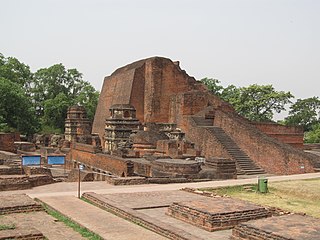
Nalanda was a renowned Buddhist monastic university in ancient Magadha, India. Considered by historians to be the world's very first residential university, and among the greatest centers of learning in the ancient world, it was located near the city of Rajagriha and about 90 kilometres (56 mi) southeast of Pataliputra, operating from 427 to 1197 CE. Nalanda played a vital role in promoting the patronage of arts and academics during the 5th and 6th century CE, a period that has since been described as the "Golden Age of India" by scholars.

Xuanzang, born Chen Hui / Chen Yi, also known as Hiuen Tsang, was a 7th-century Chinese Buddhist monk, scholar, traveler, and translator. He is known for the epoch-making contributions to Chinese Buddhism, the travelogue of his journey to India in 629–645 CE, his efforts to bring over 657 Indian texts to China, and his translations of some of these texts.
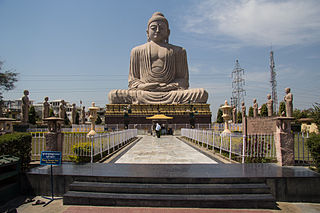
Bodh Gaya is a religious site and place of pilgrimage associated with the Mahabodhi Temple Complex in Gaya district in the Indian state of Bihar. It is famous as it is the place where Gautama Buddha is said to have attained Enlightenment under what became known as the Bodhi Tree. Since antiquity, Bodh Gaya has remained the object of pilgrimage and veneration both for Hindus and Buddhists. In particular, archaeological finds including sculptures show that the site was in use by Buddhists since the Mauryan period.

Chinese Buddhism or Han Buddhism is a Chinese form of Mahayana Buddhism which has shaped Chinese culture in a wide variety of areas including art, politics, literature, philosophy, medicine and material culture. Chinese Buddhism is the largest institutionalized religion in Mainland China. Currently, there are an estimated 185 to 250 million Chinese Buddhists in the People's Republic of China It is also a major religion in Taiwan and among the Chinese Diaspora.

East Asian Yogācāra refers to the traditions in East Asia which represent the Yogachara system of thought. The 4th-century Gandharan brothers, Asaṅga and Vasubandhu, are considered the classic philosophers and systematizers of this school, along with its other founder, Maitreya-natha.
Chen Yi may refer to:

The Heart Sūtra is a popular sutra in Mahāyāna Buddhism. In Sanskrit, the title Prajñāpāramitāhṛdaya translates as "The Heart of the Perfection of Wisdom".

Bhaiṣajyaguru, or Bhaishajyaguru, formally Bhaiṣajya-guru-vaiḍūrya-prabhā-rāja, is the Buddha of healing and medicine in Mahāyāna Buddhism. Commonly referred to as the "Medicine Buddha", he is described as a doctor who cures suffering using the medicine of his teachings.

Hsuan Chuang University is a private Buddhist university in Xiangshan District, Hsinchu City, Taiwan. Founded in 1997 by the Ven. Liao Zhong (了中) and named for the Tang Dynasty monk Xuanzang, the school was promoted to university status in 2004. It offers bachelor's and master's degrees, mainly in humanities subjects.
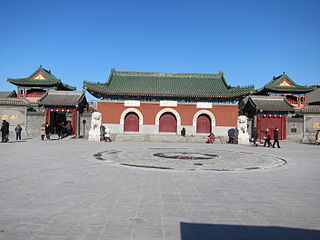
The Temple of Great Compassion or Dabei Yuan is a Chan Buddhist temple in Tianjin, China.

Linggu Temple is a famous Buddhist temple in Nanjing. It is now surrounded by a large park.
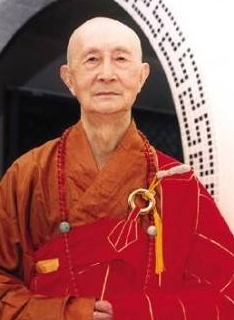
Master Yin Shun was a well-known Buddhist monk and scholar in the tradition of Chinese Mahayana Buddhism. Though he was particularly trained in the Three Treatise school, he was an advocate of the One Vehicle as the ultimate and universal perspective of Buddhahood for all, and as such included all schools of Buddha Dharma, including the Five Vehicles and the Three Vehicles, within the meaning of the Mahayana as the One Vehicle. Yin Shun's research helped bring forth the ideal of "Humanistic" (human-realm) Buddhism, a leading mainstream Buddhist philosophy studied and upheld by many practitioners. His work also regenerated the interests in the long-ignored Āgamas among Chinese Buddhist society and his ideas are echoed by Theravadin teacher Bhikkhu Bodhi. As a contemporary master, he was most popularly known as the mentor of Cheng Yen, the founder of Tzu-Chi Buddhist Foundation, as well as the teacher to several other prominent monastics.

A temple of Confucius or Confucian temple is a temple for the veneration of Confucius and the sages and philosophers of Confucianism in Chinese folk religion and other East Asian religions. They were formerly the site of the administration of the imperial examination in China, Korea, Japan and Vietnam and often housed schools and other studying facilities.

Buddhism is one of the major religions of Taiwan. Taiwanese people predominantly practice Mahayana Buddhism, Confucian principles, local practices and Taoist tradition. Roles for religious specialists from both Buddhist and Taoist traditions exist on special occasions such as for childbirth and funerals. Of these, a smaller number identify more specifically with Chinese Buddhist teachings and institutions, without necessarily eschewing practices from other Asian traditions. Around 35% of the population believes in Buddhism.
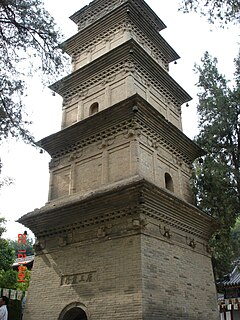
The Xingjiao Temple is located in Shaoling Yuan, Chang'an District of Xi'an. The five-storied Buddhist relic pagoda, preserving the relics of Xuanzang, is inside the temple, along with the pagodas of his disciples, Kuiji and Yuance.

Qixia Temple is a Buddhist temple located on Qixia Mountain in the suburban Qixia District of Nanjing, Jiangsu, 22 kilometres (14 mi) northeast of downtown Nanjing. It is one of Nanjing's most important Buddhist monasteries. The temple is the cradle of East Asian Mādhyamaka.

Daci'en Temple is a Buddhist temple located in Yanta District, Xi'an, Shaanxi. The temple is the cradle of East Asian Yogācāra in China. It is notable for the Giant Wild Goose Pagoda. The pagoda was originally built by an accomplished monk Xuanzang, whose story was widespread in civil society in many dynasties and the famous legendary story Journey to the West was inspired by his experience. Alongside Daxingshan Temple and Jianfu Temple, it was one of the three sutras translation sites (三大译经场) in the Tang dynasty.

Wenshu Temple or Wenshu Monastery is a Buddhist temple located in Qingyang District, Chengdu, Sichuan, China.

Xuanzang Temple or Syuentzang Temple is a Buddhist temple located in the Sun Moon Lake tourist area, Yuchih Township of Nantou County, Taiwan.

Xuanzang Temple is a Buddhist temple located within Jiuhua Mountain Park, in Xuanwu District, Nanjing, Jiangsu, China.